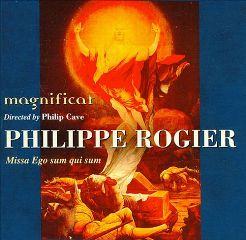Philippe Rogier - Missa Ego sum qui sum (2000)
Philippe Rogier - Missa Ego sum qui sum (2000)

1 Heu mihi Domine 4:10 2 Laboravi in gemitu meo 5:28 3 Vias tuas 7:46 Play 4 Ego sum qui sum (motet) 7:34 5 Missa Ego sum qui sum: i Kyrie 5:24 6 II Gloria 7:48 7 III Credo 10:34 8 IV Sanctus & Benedictus 6:03 9 V Angus Dei 3:15 Play 10 Taedet animam meam 4:14 11 Peccavi quid faciam tibi 6:35 12 Dominus regit me 5:38 Matthew Beale - Tenor (Vocal) Patrick Craig - Alto (Vocals) Tom Raskin - Tenor (Vocal) Carolyn Sampson - Soprano (Vocal) Francis Steele - Bass (Vocal) Magnificat - Choir/Chorus Philip Cave - Choir Director
Philippe Rogier was the last of his line, a Franco-Flemish composer serving the Spanish throne in the waning days of the Renaissance. Although the switch from Renaissance styling to Baroque composition would happen a bit slower in Spain than elsewhere in continental Europe, for some reason no more composers came down from the low countries to continue this honored practice once Rogier's assistant Géry de Ghersem tossed off this mortal coil in the year 1630. De Gershem left only one work, and Rogier only 51, so one wouldn't think that opportunities to mess this music up would be numerous. However, given the need for transparency of texture and clear delivery of entrances, there aren't many choirs that sing this particular literature to perfection. Enter Magnificat -- the English vocal group, not to be confused with the same named ensemble based in San Francisco -- under its leader Philip Cave; they have tamed the beast that is Spanish Renaissance music with a Franco-Flemish accent. The Linn Records disc Philippe Rogier: Missa Ego sum qui sum contains the aforementioned mass and a total of six motets of Rogier, plus another by Nicolas Gombert, which provided the model for Rogier's mass. This Linn disc is about as ideal an interpretation as anyone could want, with well-adjudged tempi, passionate yet pristine singing, a sense of three-dimensional projection of the voices happily married to a balanced ensemble sound, and special sensitivity and attention paid to the all-important staging of the vocal texture. These elements genuinely reveal what is great about Rogier's music; the lengthy Credo from the mass is ravishing, and there are numerous standout moments along the disc's course, not the least of which is the subtly melting, alternately glowing Gombert motet Ego sum qui sum. There may not be many choices for the music of Philippe Rogier, but Linn's Philippe Rogier: Missa Ego sum qui sum is unquestionably the best one. --- Uncle Dave Lewis, Rovi
Magnificat was formed in 1991 by its conductor, Philip Cave, to explore the rich diversity of choral music from the last five centuries. The ensemble specializes in the restoration and performance of neglected choral masterpieces with particular emphasis on music from post-Reformation England and from late 16th century Spain. Their new recording of Latin sacred music by Robert Parsons, Robert White and William Byrd (Linn Records CKD417) includes a number of paired settings ranging from the simple homophonic style of Byrd’s Christe qui lux to the rich, plangent polyphony of White’s beautiful Lamentations for five voices.
Magnificat recently released its third recording celebrating the 450th anniversary of composer Philippe Rogier: Music from the Missae Sex offers the first complete recordings of both the Missa Inclita stirps Jesse and the Missa Philippus Secundus Rex Hispaniae. Two previous recordings of music by Rogier on Linn feature the Missa Ego sum qui sum and the Missa Domine Dominus noster. The latter recording, accompanied by His Majestys Sagbutts & Cornetts, casts new light on the Spanish polychoral tradition, including the premiere recording of Rogier’s rediscovered 12-part motet Domine, Dominus noster.
Other recordings of music from ‘The Golden Age’ include an album of motets by Gesualdo, Guerrero, Josquin, Rebelo and Victoria together with Allegri’s Miserere and Palestrina’s Stabat mater, a highly acclaimed recording of Victoria’s Officium Defunctorum of 1605, and an album of Palestrina’s twenty-nine motets from the Song of Songs. Magnificat’s recording of Thomas Tallis’ forty-part motet Spem in alium was hailed as ‘quite the best recording’ by Gramophone. The album also includes the four-part Mass and Latin motets, and was selected as BBC Radio 3’s recommended performance of Tallis’ Lamentations. --- chorworks.com/magnificat/
download (mp3 @320 kbs):
yandex 4shared mega mediafire zalivalka cloudmailru uplea ge.tt








